There is nothing more terrifying than a wrong-way driver. Seeing headlights coming towards you at high speed, knowing you have no time to escape and that a crash is unavoidable, is a truly horrifying experience. For some, it is also a deadly one.
According to the AAA Foundation for Traffic Safety, about 500 people die nationwide in wrong-way crashes every year – and Texas leads the way. In 2022, Dallas County alone had at least 22 deadly wrong-way crashes. That’s a sobering statistic, especially when you consider that these crashes are entirely preventable.
The consequences of wrong-way driving can be devastating, not just for the drivers involved but also for their families and loved ones. If you have been injured or a loved one killed in a wrong-way wreck in Dallas, Fort Worth, or the surrounding areas, it’s important to seek help from an experienced North Texas wrong-way driver accident lawyer. You may be entitled to substantial compensation for medical expenses, lost wages, pain and suffering, and more.
In this comprehensive article, our personal injury lawyer explains wrong-way accidents, common causes of wrong-way car crashes, the process of recovering compensation, and how our law firm can help.
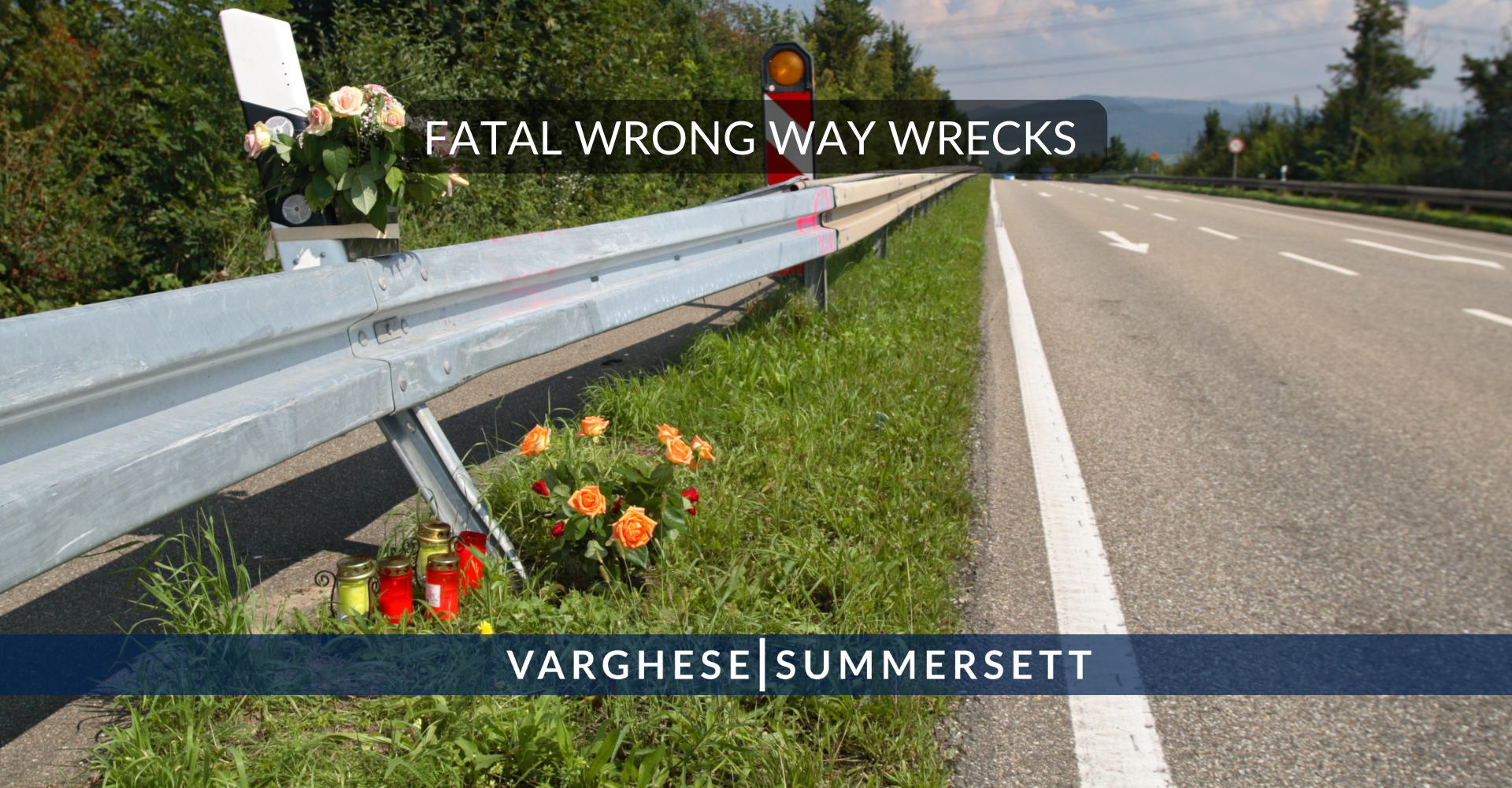
Wrong-Way Collisions Are Often Deadly
A “wrong-way accident” occurs when a vehicle travels in the opposite or wrong direction to the flow of traffic on a roadway, typically on highways or freeways, and collides with a vehicle traveling in the correct direction. These accidents are often severe and can be fatal due to the high speeds typically the vehicles involved, and the head-on nature of many wrong-way collisions.
Wrong-way accidents can be caused by various factors, including driver impairment due to alcohol or drugs, lack of proper signage, or driver confusion or inattention.
According to the AAA Foundation for Traffic Safety, more than 2,000 people died in wrong-way driving crashes on divided highways between 2015 and 2018. Of that number, 309 fatalities occurred in Texas, giving the Lone Star State the unfortunate distinction of having the highest number of wrong-way driving fatalities in the nation. These accidents are not only costly in terms of lives lost but also result in significant financial losses, including property damage and medical and funeral expenses.
If you were injured or a loved one killed in a wrong way crash, it’s extremely important to reach out to an experienced wrong-way driver accident lawyer.
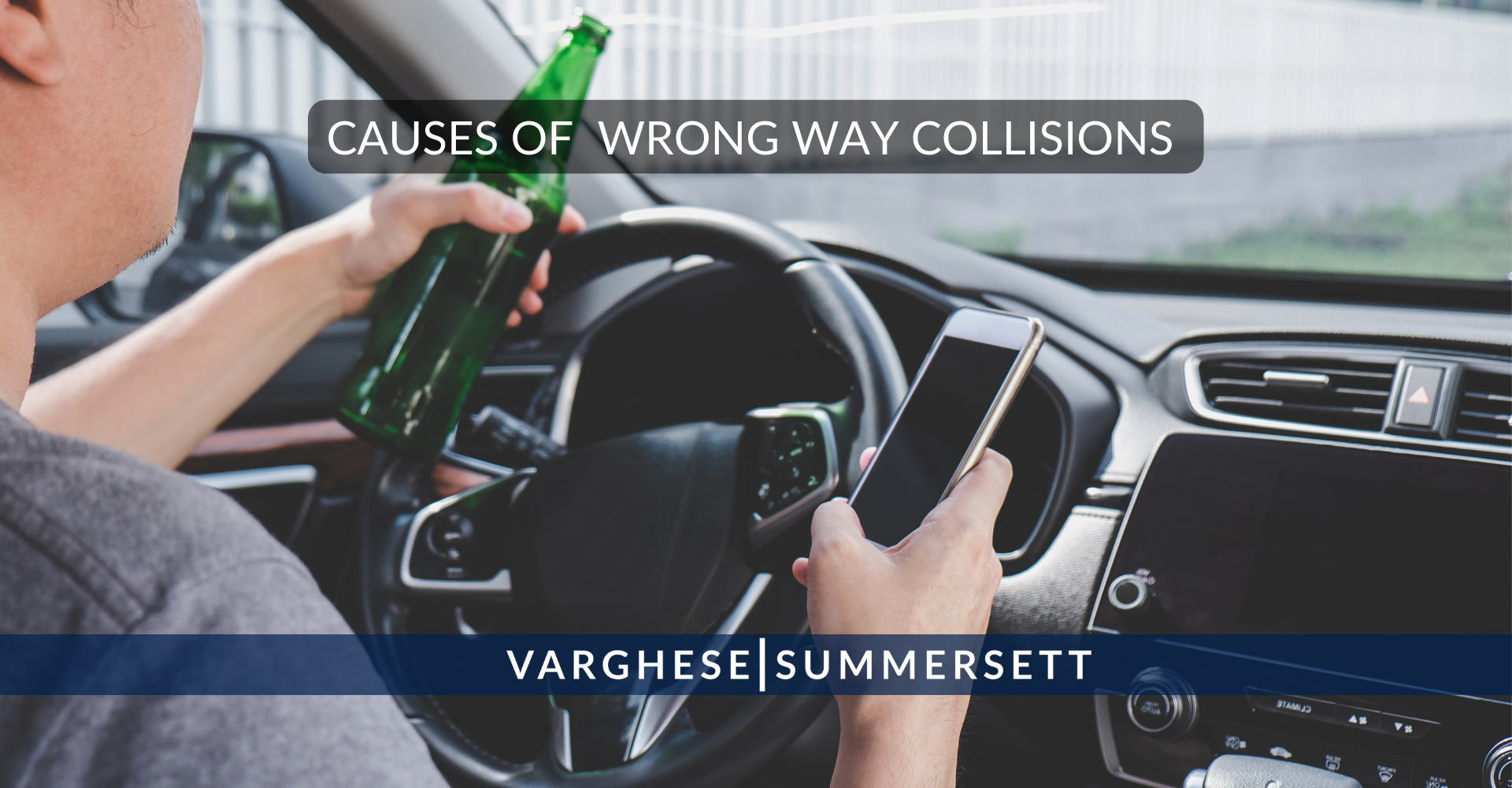
Primary Causes of Wrong Way Accidents
Alcohol and Intoxication
Alcohol impairs a driver’s judgment, coordination, and reaction times. Consider these statistics by the National Transportation Safety Board (NTSB) and AAA Foundation for Traffic Safety:
- More than half of all wrong-way drivers had blood alcohol levels more than twice the legal limit.
- Six out of 10 wrong-way crashes involved an alcohol-impaired driver.
- Drivers with blood alcohol concentrations over the legal limit of 0.08 were significantly more likely to be wrong-way drivers than non-alcohol-impaired drivers involved in the same crashes.
| Blood Alcohol Concentration (grams per deciLiter) |
Number of Wrong-Way Drivers (%) |
| BAC < 0.01 |
1053 (36.0%) |
| BAC 0.01 – 0.49 |
62 (2.1%) |
| BAC 0.05 – 0.79 |
52 (1.8%) |
| BAC = 0.08 |
1757 (60.1%) |
(Source: AAA Foundation for Traffic Safety)
This table highlights the relationship between the level of alcohol impairment and the likelihood of a driver going the wrong way. The data clearly shows that a significant majority – more than 60 percent – of wrong-way drivers had a BAC level that was above the legal limit of 0.08 grams per deciliter. This underscores the severe risk posed by alcohol-impaired drivers on the road.
The National Transportation Safety Board reported Texas had the highest number of wrong-way crashes in the nation. Between 2015 and 2018, the average number of wrong-way driver accidents that resulted in death was up 29 percent. On average, there were 77 fatalities attributed to wrong-way drivers.
Head On Crashes in Tarrant County
The Tarrant County Sheriff reported that 60 percent of fatal wrong way driver fatalities involved an intoxicated driver.
Fatigue and Drowsy Driving
Fatigue can reduce a driver’s ability to concentrate, slow reaction times, and impair decision-making. A drowsy driver might miss exit and entry signs or misinterpret road markings.
Age-Related Issues
Elderly drivers might experience confusion, especially in complex road situations. Their declining cognitive abilities and slower reaction times can contribute to wrong-way incidents. The data also shows that drivers over age 70 are more at risk of wrong-way driving than their younger counterparts.
Distractions
Distracted driving can lead to missing crucial signs or misinterpreting road situations. When drivers are looking at their phones, texting, programming the radio, or just not paying attention, it’s easy to make a mistake, like going the wrong way, which can lead to catastrophic or deadly wrong-way accidents.
Unfamiliar Roadways
Drivers unfamiliar with specific roads might inadvertently take wrong turns. This is especially true in areas with poor lighting, complex road layouts, or inadequate signage. So, when drivers are in unfamiliar territory, it’s important to pay close attention to the road signs and markings.
Road Signs and Designs
Some road designs can be confusing, especially at night or in low visibility conditions. When signs aren’t clear or intersections are poorly laid out, it’s easy for drivers to make a wrong turn or end up going the wrong way.
Road Defects
Poorly maintained roads, faded signs, or unclear markings can mislead drivers. When things are unclear, drivers can end up going the wrong way and cause head-on collisions. That’s why it’s crucial to have well-maintained roads and clear signage.
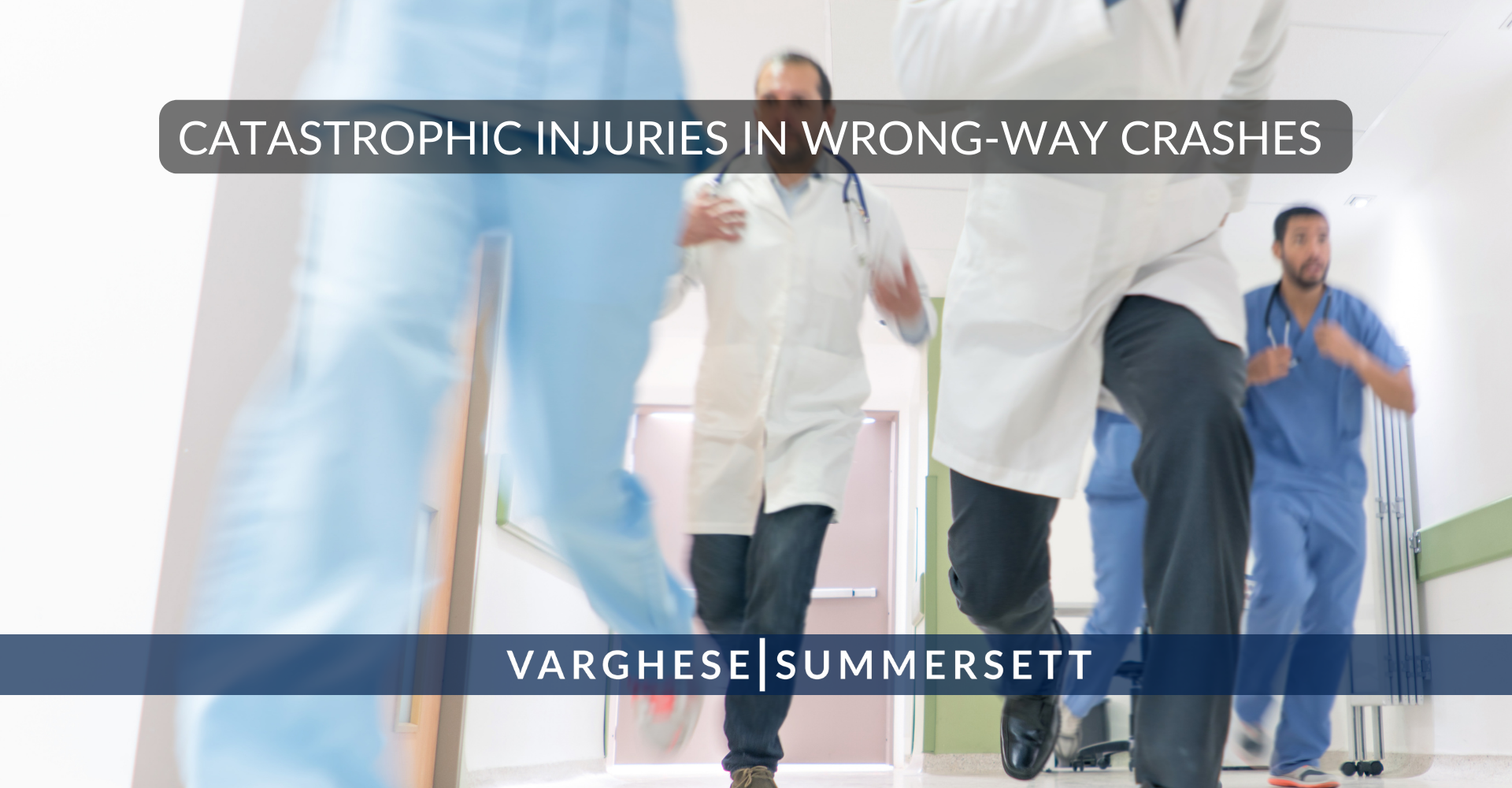
Catastrophic Injuries in Wrong-Way Driving Collisions
Head-on collisions are among the most severe types of vehicular accidents due to the combined force of two vehicles colliding. Many wrong-way head-on collision accidents involve the loss of life. Even when a life is not lost, the injuries and losses sustained can be significant. Here are common car accident injuries associated with head-on collisions:
- Traumatic Brain Injuries (TBI): The sudden impact can cause the brain to move within the skull, leading to concussions or more severe brain injuries.
- Whiplash and Neck Injuries: The abrupt back-and-forth movement of the head can strain or damage the neck muscles and vertebrae.
- Spinal Cord Injuries: The force of the collision can fracture, dislocate, or compress the vertebrae, potentially leading to paralysis.
- Chest Injuries: These can range from bruises and contusions to broken ribs and internal injuries, often caused by the seatbelt or steering wheel.
- Broken Bones: Arms, legs, wrists, and ankles are particularly vulnerable to fractures in head-on collisions.
- Internal Injuries: The impact can damage internal organs, such as the lungs, liver, kidneys, and spleen.
- Facial Injuries and Dental Trauma: These can result from the face hitting the steering wheel, dashboard, airbag, windshield, or shattered glass.
- Lacerations and Abrasions: Shattered glass and metal can cause deep cuts or scrapes.
- Psychological Trauma: Beyond physical injuries, victims may experience post-traumatic stress disorder (PTSD), anxiety, and depression.
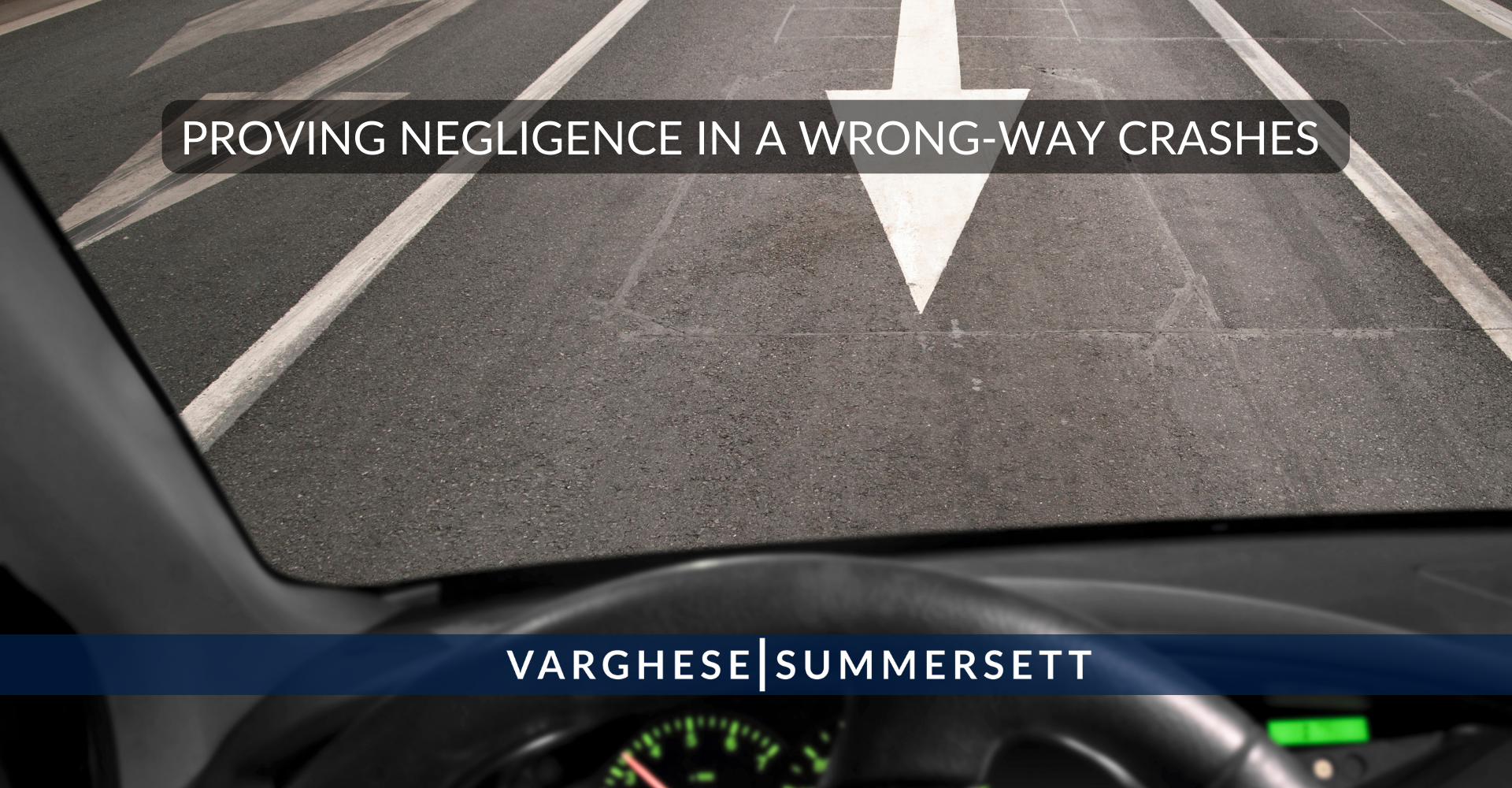
Proving Negligence in a Wrong Way Accident
In Texas, as in many states, proving negligence is imperative in personal injury cases involving wrong-way wrecks. The burden lies with the victim (or the victim’s family in a wrongful death case) to demonstrate the wrong ways driver failed to exercise reasonable care on the road. But it’s also important to point out that other entities, in addition to the wrong-way driver, may also bear responsibility for the accident, such as government entities responsible for maintaining the road or a bar owner who overserved a customer who got behind the wheel.
To establish negligence, four elements must be proven:
- Duty: It must be shown that the defendant owed a legal duty to the plaintiff, such as the duty to drive in the correct direction and obey traffic laws.
- Breach: The plaintiff must demonstrate that the defendant breached this duty, for instance, by getting drunk and driving the wrong way on a roadway.
- Causation: The plaintiff must link the breach of duty directly to their injuries, proving that it was the defendant’s actions (or inactions) that caused the harm.
- Damages: Lastly, it must be proven that the plaintiff suffered actual damages, like physical injuries or property damage, as a result of the defendant’s negligence.
Collecting strong evidence is paramount in these cases. This may include photographs from the accident scene, witness testimonies, police reports, and video footage. In addition, consultation with accident reconstruction experts can also play a pivotal role in establishing the sequence of events leading to the wreck.
Once negligence is proven, victims of wrong-way wrecks in Texas can pursue compensation for their losses, including medical expenses, lost wages, pain and suffering, and more. It’s crucial to consult with an experienced wrong way driver car accident lawyer quickly after the wreck to ensure the proper preservation of evidence and to navigate the complexities of the legal process effectively.
The wrong way driver accident lawyers at Varghese Summerett Personal Injury Law Group can help. We are based in downtown Fort Worth, but handle wrong-way wrecks in Dallas and all of North Texas.
Wrong Way Wrecks and Intoxication Manslaughter
In Texas, when an intoxicated driver causes an accident that results in the death of another person, they can be charged with intoxication manslaughter, a second-degree felony. This charge can lead to severe penalties, including imprisonment for up to 20 years and significant fines.
A criminal case is independent of a personal injury case. When a criminal charge like intoxication manslaughter is involved, it can affect the timeline of a personal injury case. The criminal case usually takes precedence, and the personal injury case may be delayed until the criminal case is resolved. This is because evidence and findings from the criminal case can be used in the personal injury lawsuit.
Additionally, the outcome of the criminal trial can significantly impact the civil case, especially if the defendant is found guilty, as it can be used as evidence of negligence in the personal injury case.
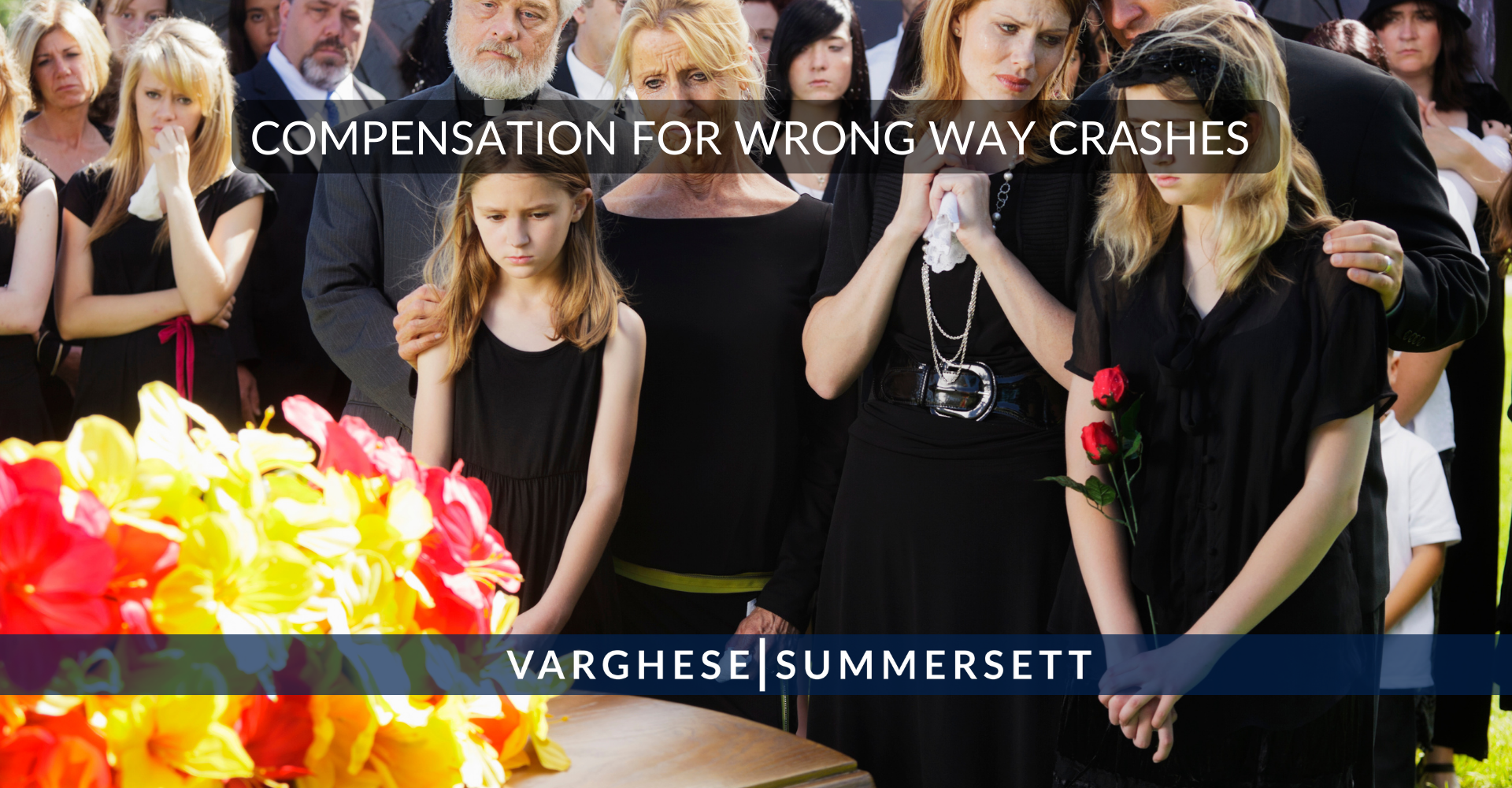
Compensation for Wrong-Way Car Accidents
Victims of wrong-way driving accidents are often entitled to seek compensation for three types of damages: Economic Damages, Non-Economic Damages, and Punitive Damages.
Economic damages are tangible and usually have a specific monetary value attached. They can cover:
Funeral Expenses: If the personal injury case involves a wrongful death, funeral expenses are a crucial component of economic damages and can cover the costs of burial or cremation, memorial services, and other related expenditures incurred by the family member of the deceased.
Medical Expenses: Treatment for injuries can lead to substantial medical bills, including hospital stays, surgeries, medications, and rehabilitation.
Lost Wages: Victims may be unable to work for an extended period, leading to lost income. Economic damage can include compensation for the earnings lost during recovery and, potentially, for future loss of earning capacity if the injuries are debilitating.
Property Damage: Head-on collisions often result in total vehicle loss, requiring repairs or complete replacement. Apart from the vehicle, personal items inside the car, like electronics or jewelry, might be damaged or lost.
Non-economic damages are intangible and relate to the pain and suffering experienced by the victim. They can include:
Pain and Suffering: This refers to compensation for the physical pain and emotional distress caused by the accident.
Loss of Consortium: This pertains to the negative effects the injuries have on the victim’s relationship with their spouse or partner. Damages for the impact of injuries on the relationship between spouses.
Emotional Distress: Emotion distress includes the psychological impact of the accident, including anxiety, depression, or PTSD.
Punitive damages are not awarded in every case but can be significant when granted. They are intended to punish the at-fault party for particularly egregious or reckless behavior and to deter similar conduct in the future. It is not uncommon for punitive damages to be awarded in a catastrophic or fatal wrong-way wreck.
When pursuing compensation after a wrong-way driving accident, it’s essential to have a knowledgeable attorney who can accurately quantify the damages incurred and advocate for a just settlement or verdict. The compensation received can play a crucial role in aiding the victim’s recovery and ensuring a semblance of justice is achieved after such a traumatic event.
Profile of a Typical Wrong-Way Crash
Wrong-way crashes on freeways have a distinct pattern. The most common origin of these incidents is the freeway exit ramp, where drivers inadvertently enter in the opposite direction. These crashes are notably more severe than other types, often resulting in death or grievous injuries.
Elderly drivers, surprisingly, are disproportionately involved in these wrong way driver accidents. Men are more frequently the wrong-way drivers than women. A significant portion, between 50 to 75 percent, involves drivers impaired by alcohol or drugs. These incidents predominantly occur during non-daylight hours, especially in the hours following midnight. These accidents frequently occur on freeway intersections and exit ramps, especially between midnight and 5 a.m., with a notable spike around 2 a.m. when bars close.
About two-thirds of the time, the drivers involved are intoxicated, often turning left onto an exit ramp mistakenly. These drivers are not just slightly over the limit; they are heavily inebriated, with blood alcohol levels often exceeding twice the legal limit.
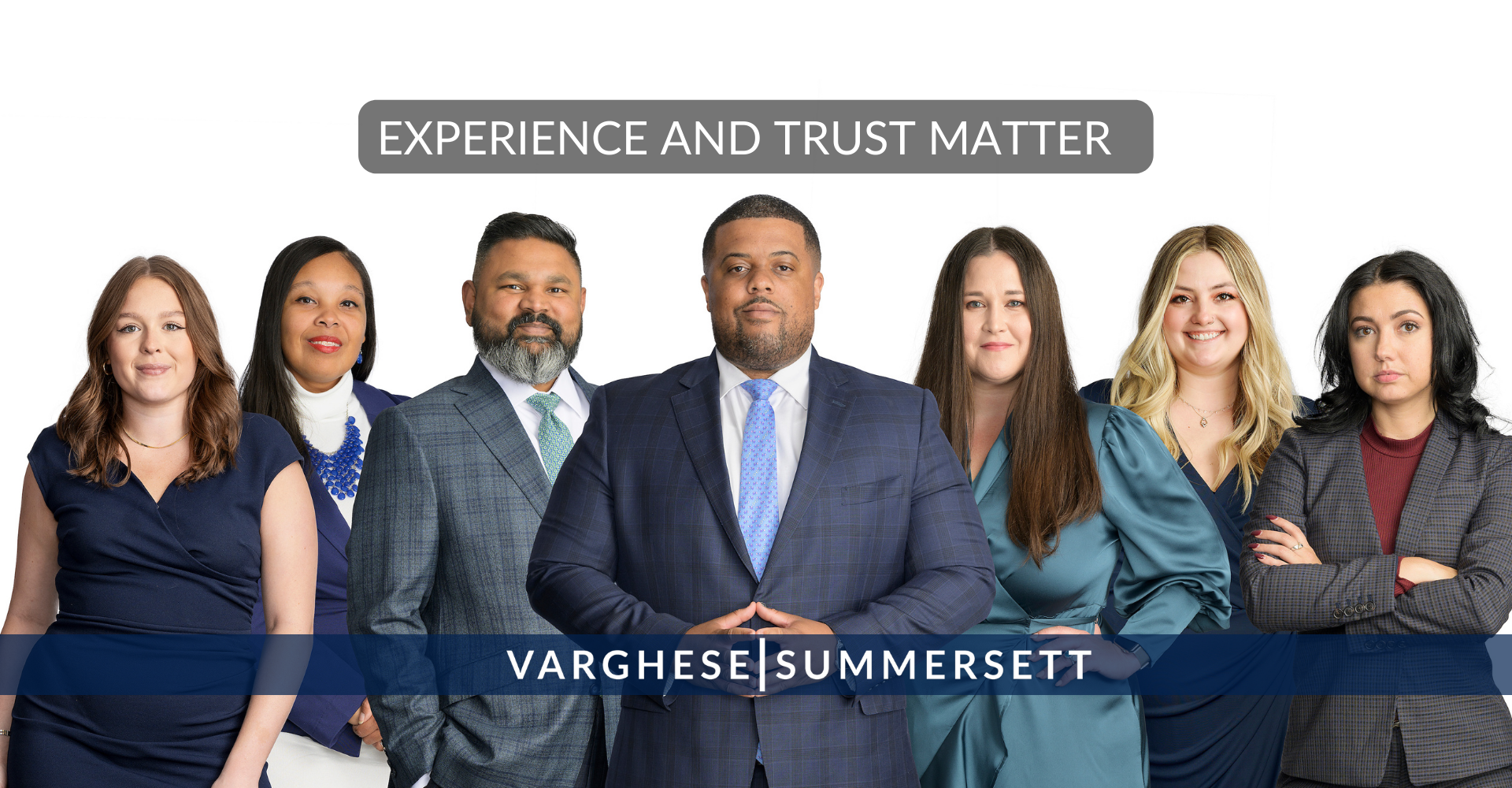 Experience and Trust Matter
Experience and Trust Matter
Why You Need an Experienced Wrong Way Driver Accident Lawyer
When navigating through a personal injury or wrongful death case, especially one involving a wrong-way accident, having an experienced wrong-way driver accident lawyer is crucial. Here’s why:
Conducting a Thorough Investigation
Determining the direct or indirect causes of a wrong-way accident involves a thorough investigation that can be incredibly complex. This complexity arises from the necessity to meticulously scrutinize accident scenes, analyze reports, and review testimonies to establish the chain of events leading to the accident.
An experienced Texas wrong-way driver accident lawyer attorney can piece together the puzzle of causation and is well-versed in leveraging expert testimonies, including those from accident reconstructionists and medical professionals, to substantiate the claims. Without establishing clear causation, achieving a favorable resolution can be challenging.
Determining Liability
In Texas, the application of a modified comparative fault system can make determining liability intricate, especially in shared fault scenarios. This system necessitates a nuanced understanding of law, as it allows for the allocation of fault between involved parties, affecting compensation. An adept attorney will navigate through these complexities, gather pertinent evidence, and advocate effectively to ensure the client’s liability is accurately represented, maximizing the chances for a fair settlement or verdict.
Calculating Damages
Victims of wrong-way accidents have the right to claim both economic and non-economic damages, and potentially punitive damages. These damages can range from tangible losses like medical expenses and lost wages to intangible ones such as pain and suffering, and loss of companionship. In cases of gross negligence, punitive damages might be applicable to punish the wrongdoer and deter similar conduct. Experienced attorneys can meticulously document damages, negotiate assertively with insurance companies, and present compelling arguments in court to secure appropriate compensation.
Negotiation and Litigation
An experienced attorney is skilled in negotiations and can navigate the often-arduous process of dealing with insurance companies and opposing counsel. They are equipped with the necessary knowledge and expertise to present a robust case, whether it’s through settlement negotiations or, if necessary, taking the casse to trial to achieve justice and secure the rightful compensation for the victims.
Emotional Support and Guidance
The aftermath of a wrongful death or severe injury is emotionally taxing for the victims and their families. An empathetic attorney and legal team can provide much-needed support and guidance through the legal maze, ensuring that the clients are informed and supported every step of the way.
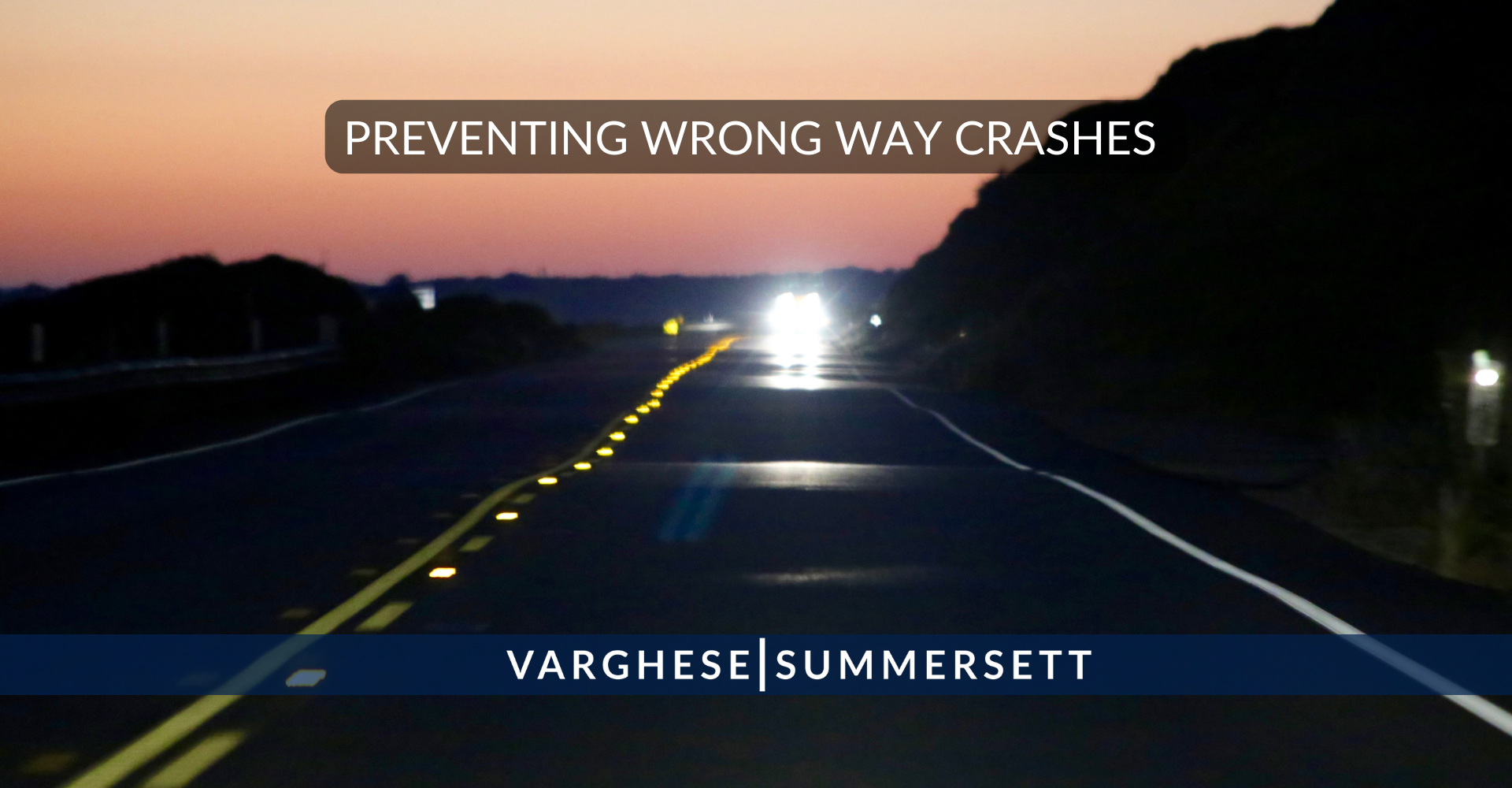
Preventing Wrong-Way Accidents
Improving Roads and Signs
Surveys conducted across state Departments of Transportation (DOTs) revealed that most states employ standard signage like DO NOT ENTER and WRONG WAY to deter wrong-way entries. However, three states have adopted a novel approach by lowering these signs to make them more visible at night, within the vehicle’s headlight beam.
An in-depth analysis of wrong-way crashes in Texas from 1997 to 2000 highlighted that these incidents are five times more likely to occur during the early morning hours. Alarmingly, about half of these crashes led to incapacitating or serious injuries or death. Men were the predominant wrong-way drivers, and a staggering 61 percent were under the influence of alcohol or drugs.
Combating Driving While Intoxicated
Driving while intoxicated is a leading cause of wrong-way driving incidents. To combat this, raising public awareness about the dangers of drunk driving is crucial. Strict law enforcement, including sobriety checkpoints and rigorous penalties for offenders, can act as significant deterrents. Implementing ignition interlock devices for repeat offenders ensures that drivers are sober before operating a vehicle. Training bartenders and servers to recognize and refuse service to overly intoxicated patrons can prevent potential DWI situations. Lastly, promoting alternative transportation options, such as public transit and rideshare services, offers safe travel choices for those who’ve consumed alcohol.
Countermeasures, Treatments, and Recommendations
To address the wrong-way driving menace, various countermeasures and treatments were considered. Traditional measures encompass standard signage and pavement markers. Innovative solutions include the use of lowered, illuminated signs and pavement lights. Geometric modifications to the road and the integration of intelligent transportation systems were also evaluated. Based on the findings, several recommendations were made. These include the installation of reflectorized wrong-way pavement arrows, especially on left-side exit ramps, and prioritizing the maintenance of these arrows. There’s also a push for lowered signage in areas with high alcohol-related incidents and during nighttime. A pivotal recommendation is the establishment of a wrong-way crash monitoring system to track and address these incidents proactively.
Prevention and Detection
Efforts to curb wrong-way fatalities include basic driving principles, such as ensuring the yellow stripe is on the driver’s left and white stripes on the right. Raised pavement markers that reflect red when a vehicle is going the wrong way have been effective. Lowering “Do Not Enter” and “Wrong Way” signs to a few feet off the ground has also proven beneficial, especially for intoxicated drivers who tend to focus directly in front of them. Advanced measures include sensors and radar equipment that detect wrong-way movements, triggering alert systems like flashing lights or audible warnings.
Future Measures and Current Challenges
Research is ongoing to develop systems that can alert other drivers about the presence of a wrong-way driver by communicating directly with their vehicles. While TxDOT is reviewing the deployment of detection technology in the Dallas district, the City of Dallas is testing tools like reflective tape on sign poles and flashing lights on signs. In 2021, Texas saw a 15.2 percent increase in motor vehicle traffic fatalities from 2020, with 24 percent of those fatalities resulting from alcohol-impaired driving.
Hire an Attorney Experienced in Battling Insurance Adjuster Objections
Wrong-way accidents, while seemingly clear-cut in terms of liability, present unique challenges when dealing with insurance adjusters or companies. At first glance, you might assume that the driver traveling in the wrong direction is automatically at fault.
However, liability is not always as straightforward as it appears. Various factors can complicate the determination of fault, such as poor road signage, malfunctioning traffic lights, or even vehicle defects that might have contributed to the accident. The other driver’s insurance company might seize upon these complexities to dispute or diminish the liability of their policyholder, making it harder for the victim to secure a fair settlement.
Coverage issues further complicate matters. In Texas, like many states, drivers are required to carry minimum liability insurance. However, these minimum policy limits may not be sufficient to cover the significant losses often associated with wrong-way accidents, which tend to be more often severe car accidents due to the nature of head-on collisions.
For instance, if a driver carries only the minimum policy limits in Texas and causes a wrong-way accident resulting in serious injury, extensive medical bills, property damage, and other losses, the victim might find that the at-fault driver’s insurance coverage falls short of adequately compensating their damages.
Furthermore, even if a victim decides to sue the at-fault driver personally for the difference, they might encounter another challenge: the driver may be “judgment proof.” Being judgment-proof means that the individual does not have the financial assets or means to satisfy a court judgment. In such cases, even if the victim secures a favorable court judgment against the at-fault driver, they may never actually receive the full compensation awarded, as the driver simply lacks the funds to pay.
In light of these challenges, victims of wrong-way accidents must approach claims with a comprehensive understanding of both the intricacies of liability determination and the potential coverage pitfalls. Hiring an experienced wrong way driver accident lawyer is imperative in navigating these complexities and ensuring that victims receive the compensation they deserve.

Parties and Entities Who Could Be Held Responsible for a Wrong-Way Collision
In a wrong-way wreck personal injury case, several entities can potentially be held responsible, depending on the circumstances surrounding the accident. Here are a few entities that might be held responsible:
The At-fault Driver
The driver who caused the accident by traveling in the wrong direction is typically the primary entity held responsible due to negligence or reckless driving.
Vehicle Owner
If the at-fault driver was operating another person’s vehicle with permission, the vehicle’s owner might also share some liability.
Employer
If the at-fault driver was operating a vehicle within the scope of employment at the time of the accident, the employer might also be held responsible under the legal doctrine of respondeat superior.
Automobile Manufacturers
If a defect in the vehicle contributed to the accident, such as a malfunctioning brake system, the vehicle manufacturer or parts manufacturer might be liable.
Government Entities
In some cases, a government entity may bear some responsibility if it can be proven that the wrong-way car accident resulted from poorly designed, constructed, or maintained roadways, or from inadequate signage.
Bars or Restaurants
If the wrong-way driver was intoxicated, the establishment that served the alcohol might be held responsible under dram shop laws if they served alcohol to a visibly intoxicated person.
Construction Companies
If road construction or maintenance work contributed to the confusion leading to the wrong-way driving, the company responsible for the work might be held liable.
Other Drivers
Sometimes, the actions of other drivers can contribute to the occurrence of a wrong-way wreck, making them partially responsible.
Pedestrians or Bicyclists
In rare instances, the actions of pedestrians or bicyclists might contribute to causing a wrong-way wreck, leading to potential liability
Determining liability in a wrong-way wreck personal injury case involves a thorough investigation and sometimes requires the expertise of accident reconstruction specialists. The identified responsible parties can vary based on the unique facts and circumstances of each case. An experienced personal injury attorney can help in identifying all potential liable parties, ensuring all avenues for compensation are explored.
How Varghese Summersett Can Help
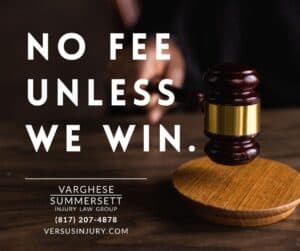
Varghese Summersett Injury Law Group has the experience, resources, and tenacity to take on everyone who bears responsibility for a wrong-way crash that resulted in catastrophic injuries or a wrongful death.
We will actively investigate the cause of the accident, collaborate with experts to ascertain fault and liability, and fight to ensure that victims and their families receive the compensation they deserve. Oftentimes, that can be accomplished through aggressive settlement negotiations. Other times, it means we must take the case to trial. We stand ready.
Most importantly, hiring our team will not cost you anything upfront or out of pocket. We work on contingency, which means that we only get paid after we recover a settlement or verdict for you.
If you or a loved one were involved in a wrong-way accident in Dallas, Fort Worth or the surrounding areas, call 817-207-4878 (HURT) for a free consultation with an experienced wrong-way driver accident lawyer.